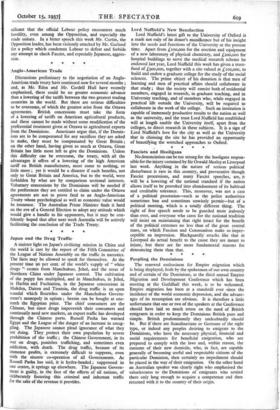Japan and the Drug Traffic A sinister light on Japan's
civilising mission in China and the world is cast by the report of the Fifth Committee of the League of Nations Assembly on the traffic in narcotics. The facts may be allowed to speak for themselves. At the present time 90 per cent. of the world's supply of "white drugs " comes from Manchukuo, Jehol, and the areas of Northern• China under Japanese control. The cultivation of the poppy has multiplied, and in Manchukuo, in Jehol, in Harbin and Fuchiatien, in the Japanese concessions in Mukden, Dairen and Tientsin, the drug traffic is an open scandal which flourishes under the Manchukuo Govern- ment's monopoly in opium ; heroin can be bought at one- tenth the Egyptian price. The chief consumers are the Chinese, but since drugs impoverish their consumers and continually need new markets, an export traffic has developed through the Chinese ports. Russell Pasha has warned Egypt and the League of the danger of an increase in smug- gling. The Japanese cannot plead ignorance of what they are doing. They, protect their own population by severe prohibition of the traffic ; the Chinese Government, in its war on drugs, punishes trafficking, and sometimes even addiction, with death. The drug traffic, because of its immense profits, is extremely difficult to suppress, even with the sincere co-operation of all Governments. As Russell Pasha has said, it is hydra-headed ; suppressed in one centre, it springs up elsewhere. The Japanese Govern- ment is guilty, in the face of the efforts of all nations, of deliberately fostering this criminal and inhuman traffic for the sake of the revenue it provides.






















































 Previous page
Previous page